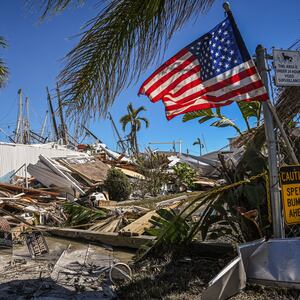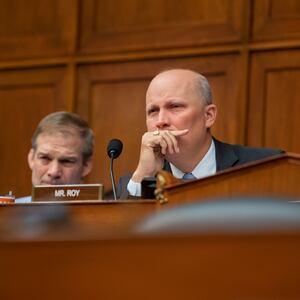As Hurricane Ian ravaged south Florida on Thursday, House Minority Leader Kevin McCarthy (R-CA) stood outside the U.S. Capitol at a press conference and made a vow to the victims.
“We’ll do anything in our power to help them,” McCarthy said, responding to a question from a reporter about the impacts of the hurricane, and Gov. Ron DeSantis’ ability to help his state recover.
As the GOP leader said this, he was flanked by dozens of members of his House Republican conference. Their presence added a new dimension to McCarthy’s statement: many of them have been on the record opposing hurricane relief packages—or lent their support to proposals designed to drastically reduce the amount of money the federal government spends on disaster relief.
The Republican Study Committee, for instance, is the largest internal GOP conference group. Its 156 lawmakers include the second- and third-ranking members of McCarthy’s team: Rep. Steve Scalise (R-LA), the minority whip, and Rep. Elise Stefanik (R-NY), the conference chair.
The annual RSC budget, a statement of priorities approved by its conservative membership, clearly targets disaster relief as a source of wasteful spending to be cut. The latest budget includes a call to “equalize cost-sharing for disasters.”
“To ensure states are not incentivized to rely on federal coffers for disaster relief, the RSC Budget proposes reducing the federal cost share to 50 percent, equalizing the cost to both the federal and state governments,” the document reads.
With Hurricane Ian still causing serious damage in the United States, congressional leadership has yet to outline specific plans to fund recovery and relief efforts.
But given the scale of devastation in Florida—and the widespread damage to Puerto Rico after Hurricane Fiona hit last month—an extensive, likely multi-billion dollar package may be at the top of Congress’ agenda when it returns in November.
Spokespeople for Scalise and Stefanik did not respond to questions from The Daily Beast regarding whether they would apply the standard set out in the RSC budget to future hurricane relief aid. Neither did a spokesperson for Rep. Jim Banks (R-IN), the chairman of the RSC, who is also running to be the third-ranking House Republican next year, nor McCarthy’s office.
If Republicans were to stick to the position outlined in the RSC document, it would run contrary to what DeSantis himself has called for. On Wednesday, his administration asked President Joe Biden to allow the Federal Emergency Management Agency to cover 100 percent of “emergency protective measures” for the first 60 days after the hurricane’s landfall.
The conflict between lawmakers’ public promises to help the storm’s victims—and their own commitment to blocking or reducing the scope of that help—would be just the latest instance of the congressional GOP trying to have it both ways when it comes to disaster relief.
In the last decade, congressional Republicans have made it a key principle that disaster aid bills be “fiscally responsible” while applying that principle in conspicuously uneven ways.
Funding disaster relief packages, like funding the government, was once considered a noncontroversial and nonpartisan duty for Congress. But amid the Tea Party’s rise, a crop of new, hard-right Republicans began to see opportunity in leveraging these bills as a way to communicate their conservative bona fides to the party base.
After Hurricane Sandy struck in 2012, a group of conservative lawmakers—many of them from Texas—revolted against extensive federal spending to help New York and New Jersey rebuild after the devastation. Reflecting the rhetoric at the time, then first-year Sen. Ted Cruz (R-TX), hyped rescue legislation as being full of wasteful “pork.”
An initial $10 billion Sandy relief bill was opposed by 67 House lawmakers, including DeSantis—then a freshman House member—and Rep. Paul Ryan (R-WI), the future Speaker of the House. Showing how politicized disaster relief had become, 58 of the lawmakers who voted no on Sandy relief voted in favor of a large aid bill in response to Hurricane Katrina.
DeSantis’ vote quickly became a defining moment in his political career, The New York Times reported this week, opening him up to criticism back home. The young conservative, at the time, resisted disaster aid so as to reject what he called a “put it on the credit card mentality.” Later, he would tell skeptical local press that he “never made the point of saying we shouldn’t do anything.”
Months after Sandy, Congress considered a more comprehensive $50 billion package to help devastated communities in New York and New Jersey recover. Overwhelming majorities of the GOP conferences in both chambers voted against it: 179 House Republicans and 36 Senate Republicans.
Afterward, many of these lawmakers earned the permanent scorn of New York and New Jersey lawmakers, regardless of party. “It was cruel, it was vicious, and something that I’ll never forget,” former Rep. Peter King, a Long Island Republican, once said.
Some of those Sandy-affected lawmakers, according to the Texas Tribune, began keeping a list of those in the so-called “Comeuppance Caucus” should it be necessary to one day, after a disaster, rub that vote in their faces.
But after Hurricanes Harvey and Irma unleashed historic flooding and winds on the Gulf Coast in 2017, many northeastern U.S. members took pride in not showing that state the same treatment that its lawmakers had shown them in the wake of Sandy.
“NY won’t abandon Texas,” King tweeted at the time.
The first tranche of Harvey aid, a nearly $8 billion package, passed the House with only three lawmakers, all Republicans, voting no. Two of them had been in office to vote against the Sandy relief. All the other remaining Republicans who had voted against Sandy relief approved the package for Harvey.
In their Obama era of fiscal conservatism, GOP lawmakers seemed content to approve disaster relief for their own states but oppose it for others. Although the budget-busting presidency of Donald Trump seemed to signal the end of austerity as a key priority on the right, the principle is still embedded in the party platform, as the RSC document clearly indicates.
As long as Democrats control Congress, Republican lawmakers may continue to choose prioritizing fiscal conservatism over disaster relief—even when disaster hits their districts, as it did this week with Hurricane Ian, which tore through Florida before targeting the Carolinas.
Before lawmakers left Washington for the October recess, they passed a stopgap bill to fund the government until December. Included in that so-called “continuing resolution” was $18 billion for a special fund under the Federal Emergency Management Agency that Florida authorities could potentially begin accessing immediately to speed recovery efforts.
These days, it is common practice for Republicans to vote against a continuing resolution, especially if Democrats are in charge. Despite this stopgap spending bill’s potential to help assist hurricane relief efforts, all 16 GOP members of Florida’s congressional delegation voted it down, joining all but 10 GOP lawmakers in doing the same for a bill to keep the government running for 11 weeks.








